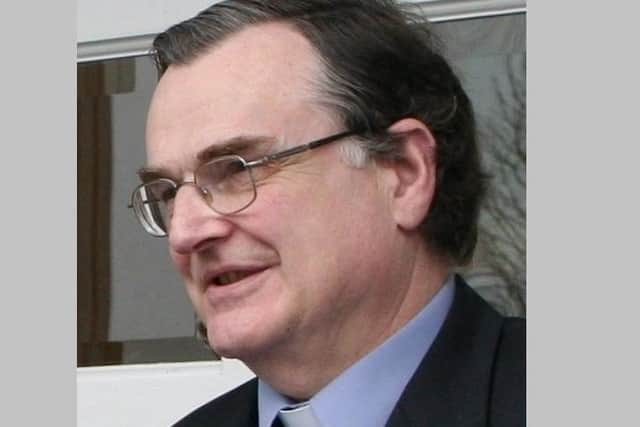Ian Ellis: The persecution of Christians and the abuse of other groups is an immense global challenge


The UPR is undoubtedly an important process which is aimed at improving the human rights situation in each of the 193 UN member states.
They are individually reviewed every five years and a final report sets out the recommendations they are each required to implement before the next review.
Advertisement
Hide AdAdvertisement
Hide AdLord Ahmad, a former Vice-Chairman of the Conservative Party, described freedom of religion or belief as a continuing priority for the UK.


The importance of the subject was, he said, underlined by his own appointment as the first prime minister’s Special Envoy for Freedom of Religion or Belief and the subsequent appointment of Rehman Chishti MP to the role.
He wrote that the UK remained “deeply concerned by the scale and severity of violations of the right to freedom of religion or belief around the world”.
He pointed out that last year the government commissioned an independent review into the support that the Foreign Office provides to persecuted Christians globally, adding that work was already underway to implement its recommendations which he said would not only support Christians but also members of other persecuted faiths.
Advertisement
Hide AdAdvertisement
Hide AdSpeaking at the Foreign Office last July, former Foreign Secretary Jeremy Hunt said that when he became Foreign Secretary he learned that almost a quarter of a billion Christians were still enduring persecution around the world and that the evidence showed that the situation was becoming worse.
Mr Hunt said: “The number of countries where Christians suffer because of their faith rose from 128 in 2015 to 144 a year later. In the Middle East, the very survival of Christianity as a living religion is in doubt. A century ago, 20% of the region’s people were Christians; today the figure is below 5%.”
Indicating that his concern was not only for Christian believers, Mr Hunt said that in his first weeks as Foreign Secretary he prioritised the plight of the Rohingya Muslims, who he said were “targets of a brutal campaign of ethnic cleansing mounted by the army of Burma”.
However, he went on to point out that Christians are believed to be targets of about 80% of all acts of religious discrimination or persecution in the world today, suggesting that it had perhaps been on account of “misguided political correctness” or a reluctance to address religious issues that British governments had not always properly grappled with the problem.
Advertisement
Hide AdAdvertisement
Hide AdIt was for that reason, he said, that towards the end of 2018 he had asked the Church of England’s Bishop Philip Mounstephen to review the Foreign Office’s support for persecuted Christians and to recommend improvements.
Thanking Bishop Mountstephen for his final report, Mr Hunt said it described “in harrowing detail” the scale of the suffering and the moral obligation that resulted.
The bishop wrote: “If one minority is on the receiving end of 80% of religiously motivated discrimination, it is simply not just that they should receive so little attention.”
His report highlighted the “decimation” of some of Christianity’s “oldest and most enduring communities”.
Advertisement
Hide AdAdvertisement
Hide AdRegarding the issue of human trafficking, Lord Ahmad referred in his November 15 statement to the government’s desire to “drive forward co-operation in the global fight against modern slavery”.
He referred to recommendations for improved support for victims, greater legislative proscription of human trafficking crime and engagement with businesses to tackle the risks of modern slavery in supply chains.
Lord Ahmad said the government recognised that if the international community was going to make significant inroads into the eradication of forced labour, modern slavery and human trafficking, there had to be an urgent galvanising of co-ordinated global action.
He added that the government is continuing to push for “implementation of the commitments contained in the Call to Action to End Forced Labour, Modern Slavery and Human Trafficking, which was launched at the UN General Assembly in 2017”.
Advertisement
Hide AdAdvertisement
Hide AdOn press freedom, Lord Ahmad called on the government of Egypt to release “those detained for exercising their right to freedom of expression, including all journalists, activists and human rights defenders, and unblock news and social media websites”.
He also expressed deep concern at “the scale of violence from security forces in recent protests, and reports of media intimidation and suppression” in Iraq, adding: “Freedoms of expression, peaceful assembly and association must be protected.”
The UN Educational, Scientific and Cultural Organization (Unesco) has described freedom of expression and specifically press freedom, as “crucial foundations of democracy, development and dialogue, and as preconditions for protecting and promoting all other human rights”.
The extent of serious injustice on many fronts across the world today is not only a matter of concern but also presents a very distressing picture.
Advertisement
Hide AdAdvertisement
Hide AdWhile it is reassuring to know that it is with real seriousness and focus that the UK government, other governments and the UN are responding to the many different injustices across the globe, the task remains immense.
• Canon Ian Ellis is a former editor of The Church of Ireland Gazette